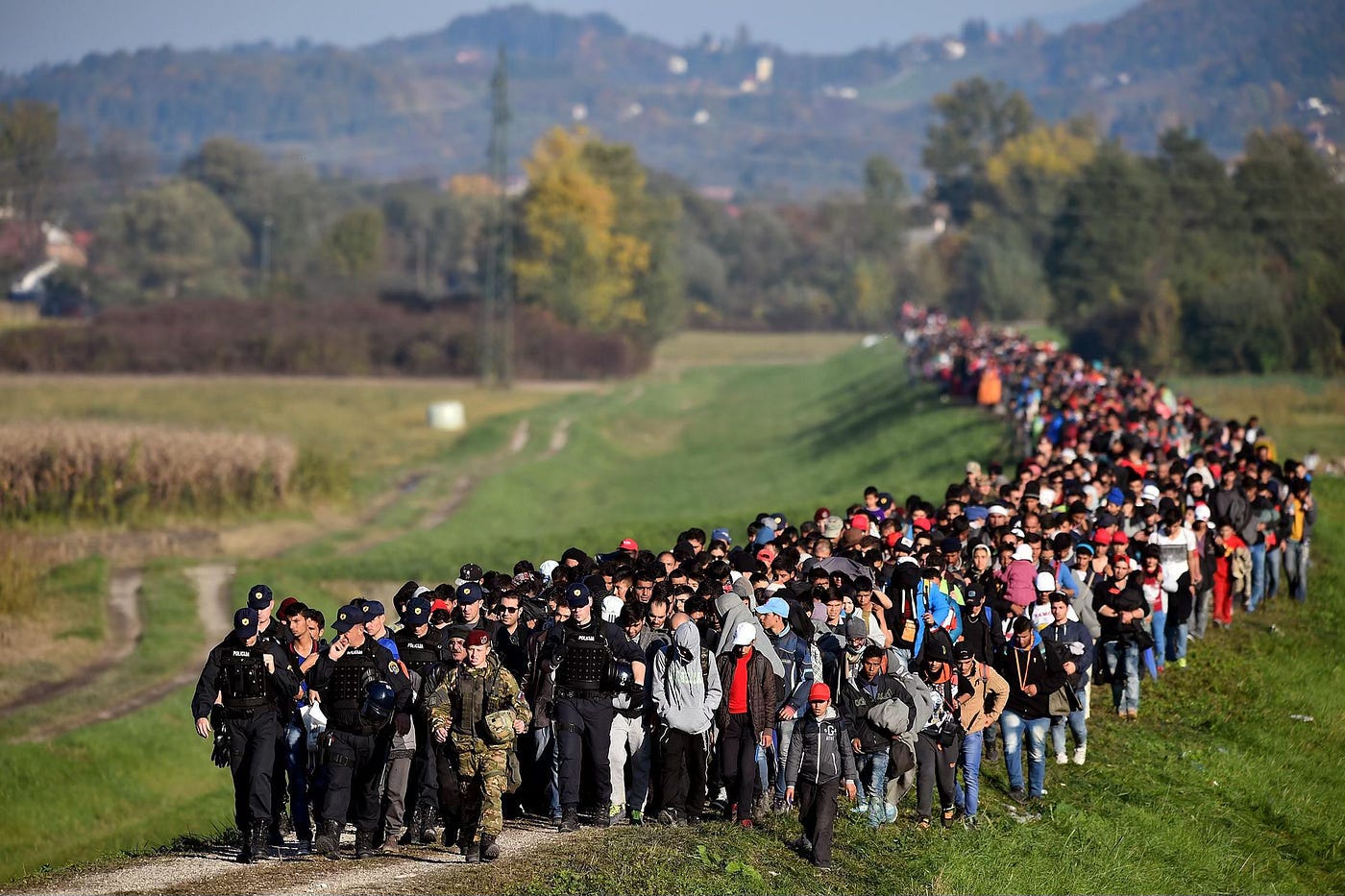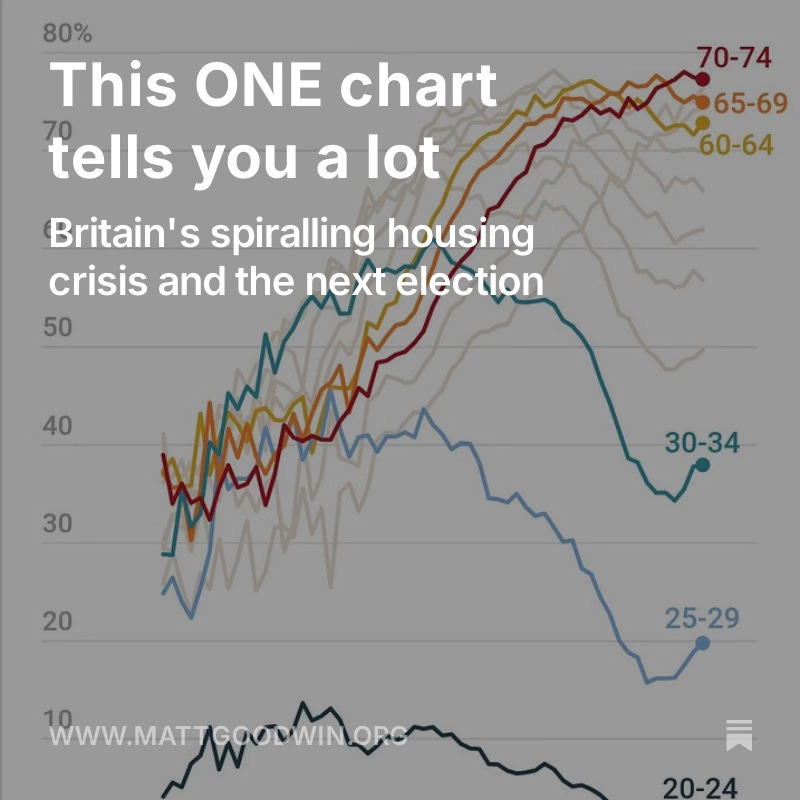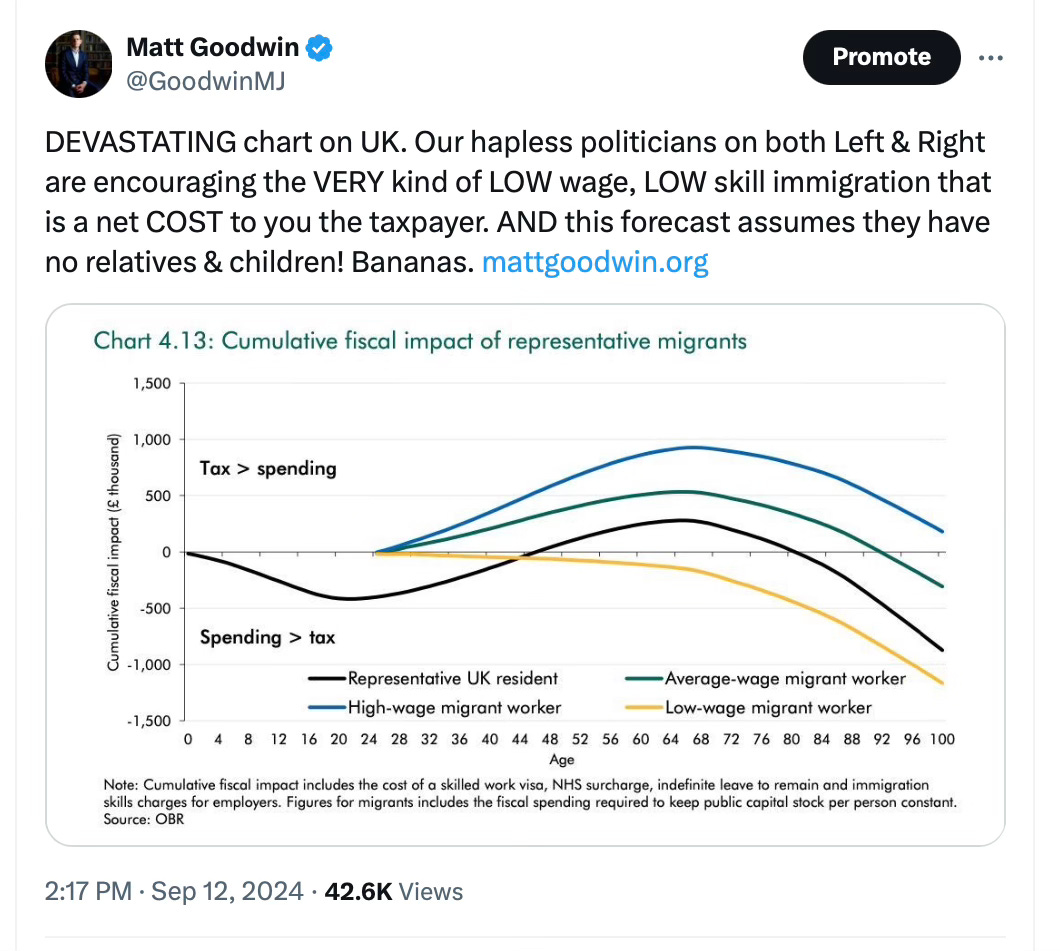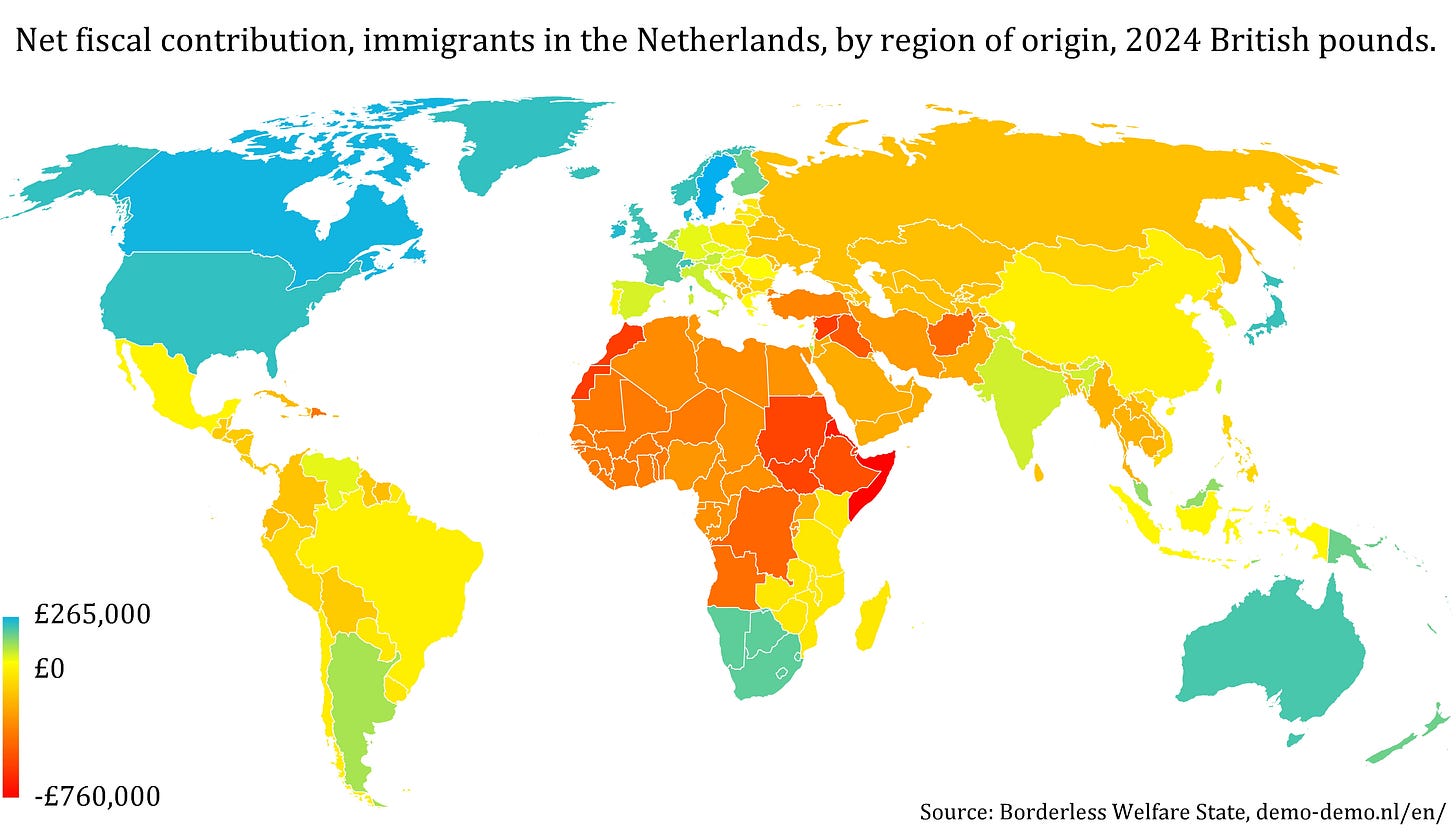The economic case for mass immigration is COLLAPSING
It shouldn't be controversial to suggest immigration is making us poorer
Matt Goodwin’s Substack goes to more than 56,400 subscribers from 167 countries around the world and thousands of paying supporters who support our work. Like our stuff? Then help us expand by becoming a paid supporter and access everything —the full archive, exclusive posts, polling, leave comments, join the debate, get discounts, advance notice about events, and the knowledge you’re supporting independent writers who are not afraid to push back against the grain. You can join us on YouTube, Instagram, TikTok, Twitter/X and Facebook.
This is a co-authored piece with Dr. Jan van de Beek, a leading expert on economics and immigration who received his PhD from Amsterdam. He is writing a book on immigration, welfare, and culture and is somebody who I rate highly. You can follow him on X.
Listen to the expert class and they’ll tell you mass immigration is good for Western economies. It’s driving growth, making us more productive, making our societies more prosperous and improving living standards. But this is a myth.
Mass immigration —as a growing pile of evidence across Europe now shows— is not good for Western economies. On the contrary, if you look past the pro-immigration zealots masquerading as serious economists on Twitter and engage with the actual evidence then you’ll soon realise that much of the immigration flooding into the West is hollowing out our economies, taking more out of them than it’s putting in.
Look at the UK. A couple of weeks ago, the Office for Budget Responsibility (OBR) released a new report on the country’s fiscal risks, concluding that the country’s finances are on an unsustainable path. Over the next half-century, because of the UK’s ageing society and climate risks, public spending is forecast to rise from 45% to over 60% of GDP, with debt as a percentage of GDP soaring to an eye-watering 274% in the coming decades. In short, we’re heading for disaster unless something changes.
But what was also interesting about this report is that, unlike what usually happens, it did not point to mass immigration as the answer to these problems. Why? Because even the technocrats at the OBR have finally realised that the current model of mass immigration that we are pursuing in the UK is weakening, not strengthening, the economy. In short, the very kind of immigration that our hapless political elites on both the Left and the Right have been encouraging since Brexit—low skill, low wage, non-selective immigration from outside Europe— is the most economically damaging.
For a start, the OBR quietly notes that mass immigration is contributing to what is known as ‘capital dilution’, or what I call ‘the population trap’. This is what happens when populations expand so quickly that the sheer scale and speed of this population change exceeds the capacity of the state to provide its own citizens with functioning public services —such as a functioning NHS and education system— as well as things like affordable and available housing and safe neighbourhoods. Mass immigration, in short, is managed decline because it’s putting enormous pressure on a state that is already struggling to provide public services for its existing population.
This is what the Canadians, the Swedes, and many others are now finally realising —that the sheer scale of demographic change over the last twenty years or so has been so great that the state is now simply unable to perform its most basic functions. And this is what is now happening in the UK —even if much of the elite class ignore it.
Since 1997, net migration added nearly 6 million people to the country, with close to 4 million arriving since 2010 under Conservative-led governments, the most pro-immigration governments in history. In 2022 and 2023 alone, more than 2.4 million people migrated into the UK. But at the same time growth has remained low, productivity and wage growth have stagnated, and the country has recorded the worst GDP-per-capita figures since the 1970s. Where is the booming, dynamic, innovative, prosperous economy that the pro-immigration lobby promised us would arrive?
Look around at the NHS, our education system, and infrastructure and it’s already crystal clear to many that these changes are imposing other costs. As the OBR notes in typically technocratic lingo, the sheer scale of this migration is diluting what it calls ‘the public capital stock per person’. In other words, the British people and their children are now being pushed by incompetent elites into a big debt, big state, big spending, big tax society that will increasingly be defined by masses of immigration from outside Europe and even worse public services than we have now.
Some of these costs have already been tracked. One think-tank, Oxford Economics, estimates that the very kind of mass immigration from outside Europe that the old parties are now imposing on the rest of us has cost the UK economy somewhere around £9 billion. In housing, too, we already know that mass immigration is driving up house prices and rents, requiring the UK, which built only 180,000 homes last year, to build some 550,000 homes each year if it is to keep up with the demand from immigration, in turn making it harder for British families, workers, and young people to get onto the housing ladder. As I’ve said before, you can have available and affordable housing for British families or mass immigration. You can’t have both.
Then come the less visible but still significant costs to the public purse —like the fact nearly 2 million state school pupils do not speak English as their first language, that immigrants made 7 million new GP registrations between 2010 and 2022, that our broken asylum system cost us at least £7 billion a year, and that immigrants are disproportionately more likely to be arrested —all costs that you are not supposed to discuss or mention in polite society but which you, the taxpayer, are still forced to pay each year while being told this model of mass immigration is actually good for you.
But surely the economic contribution that immigration is making outstrips these costs, right? Nope. As I’ve been arguing for years, the OBR has finally looked at the fiscal impact of different types of immigration into Britain and concluded that the very kind of low-skill, low-wage migration that our hapless politicians in Westminster are now encouraging is a net fiscal cost, not benefit, to the economy and taxpayers.
As the OBR analysis finds, an average low-wage migrant costs the taxpayer about £150,000 by the time they reach 60, about £465,000 by the time they reach their 80s and about £1 million if they live to 100. The OBR also find that tweaking different kinds of migration makes little difference to our country’s growing debt problem. In short, mass immigration is simply not the panacea the expert class want you to think it is.
And the OBR find this while suffering from big problems. They make some truly bizarre calculations, like assuming immigrants have no children and dependents and while completely disregarding things like the fiscal cost of immigration on housing, education, and crime —which have been shown to be significant.
And here’s something else that many people in Westminster don’t want you to know —it’s the same story in other economies across the West. Just as evidence in the UK is starting to show, many studies in Europe, which are based on MUCH more granular data than we have in the UK, are finding that mass immigration is undermining, not strengthening, economic prosperity in the West.
One massive problem in the UK —which I’ve been talking about in recent months— is that while we know in broad terms that mass immigration is now making us poorer we also do not have the very granular data on things like welfare claims, taxation, and criminality by nationality and immigration status that are available in other countries and would allow us to paint an even more detailed picture of what’s going on.
Why? Because the state and civil servants very clearly want to keep this data hidden from you, the taxpayer, or they are so incompetent they are not collecting it in the first place. You’re being forced, in other words, to pay for the costs of this political project while the state simultaneously refuses to show you data on the impact immigration is having on your economy, welfare state, NHS, prison sentence, and more, and then being called a racist or misinformed lemming if you ask questions. It’s unbelievable.
But other countries HAVE been collecting and crunching this data and they find a very consistent and alarming story. In recent years, research in Denmark, Sweden, Germany and other countries that we’ll come to has converged on the same point: mass immigration, though especially low-wage, low-skill, and non-European migration from the Middle East and Northern Africa —precisely the kind that’s now flooding into Europe and the UK—is a net fiscal cost to economies in Europe. It’s hollowing them out from the inside and eroding their welfare states.
One of the most detailed studies, the Borderless Welfare State, at the University of Amsterdam, paints a striking and bleak picture. It’s based on incredibly detailed and reliable data on individuals in the population. What did it find? It found clear and overwhelming evidence that much of the immigration that’s flooding into the country is undermining the welfare state and imposing big costs on the economy.
Why? Because much of the immigration into the Netherlands, like much of the immigration into the UK, is being driven by less well educated immigrants who cling to the welfare state and take more out of it than they put in.
As Jan van der Beek’s research shows, the share of poorly educated people in the 25-65 age group among non-European immigrants (34%) is twice as high as among the native Dutch (17%). And because the poorly-educated are more likely to rely on welfare this is increasing the proportion of net recipients in the population, upsetting the balance. This is exactly why Milton Friedman said: ‘You cannot simultaneously have free immigration and a welfare state’. It’s also why other scholars warn mass immigration erodes social trust and support for welfare —not least as the native population begin to realise they are merely subsidising outsiders from very different cultures who often hate who they are and are a net fiscal drain on the economy.
As Jan van der Beek also finds, while poorly-educated immigrants are a net fiscal cost on Western economies, so too are migrants who are moving into the West to join family members, study, or seek asylum (as many in the UK are doing). In the UK, for example, while people often assume that international students are affluent PhD students from Chile the reality is quite different. More than 40% of graduate visa holders in the UK earn less than £15,000 a year, with many ending up servicing the low-wage, low-skill Deliveroo economy. Only migrants who are moving for work make a net contribution although even then the pattern is mixed. As van der Beek finds, whereas labour migrants from North America, Oceania and Japan bring a net fiscal gain to the economy of some £670,000, asylum migrants from Africa, like many of those arriving in the UK, cost the Dutch a net cost of £685,000 per migrant.
Family and asylum migration is especially costly (which has also been found in Belgium). In fact, in the Netherlands it’s estimated that granting one asylum request to one migrant costs Dutch taxpayers about £1.1 million —to cover the asylum-seeking migrant, their family members, and the impact of the second generation.
There are also enormous differences according to where migrant workers come from. On average, migrant workers from Africa, the Middle east, and Central and Eastern Europe are a net fiscal drain. Their education and income is low, making them, on average, net recipients of the welfare state. This is aggravated by higher rates of family-related migration that come with labour migration, which doubles the cost.
One example are low-skilled, guest-worker migrants from Morocco and Turkey who have grown from 55,000 in the 1970s to 935,000 since. In 2016, in the Netherlands, these guest-workers and their descendants were net fiscal recipients of an astonishing £8 billion –equivalent to 2.5% of all government spending—which is even more striking given they tend to be younger and in theory should be net contributors.
The most costly forms of migration are asylum-seekers from the Middle East and Northern Africa. This is in line with findings from the Danish Ministry of Finance, who also single out the so-called ‘MENAPT’ region (Middle East, North Africa, Pakistan and Turkey) as the region that is associated with the biggest fiscal costs to Western economies and brings the biggest problems with integration.
Research in Finland, too, also shows that immigrants from “the greater Middle East” - a region that includes the Middle East, Central Asia, Pakistan, North Africa and countries such as Sudan and Somalia - have by far the greatest negative fiscal impact in Finland. Calculations for Belgium, likewise, confirm this.
In other words, while the costs of mass immigration to the UK are finally starting to emerge in the research, if you look at far more detailed and reliable studies elsewhere in Europe they tell a consistent and worrying story. It is exactly the kind of low-wage, low-skill, low-educated, and non-European forms of immigration that the UK is now welcoming with open arms, much of it from places like the Middle East and Northern Africa, that is precisely the most financially costly and most likely to erode rather than bolster our national prosperity.
Ordinarily, were we living in some other galaxy, then you might expect our politicians and policymakers to know all this and act accordingly, perhaps by completely changing gear and delivering the kind of high-skill and lower levels of immigration they promised the British people during Brexit referendum and its aftermath.
But, instead, they appear to have their fingers in their ears, screaming at anybody who dares to point all this out while leading us all into managed decline. And there are very good reasons to expect this to get a lot worse. Just look at how the UK’s population is forecast to grow in the years and decades ahead.
Our already rapidly expanding population is forecast to surge by another 6.5 million people by the year 2036, equivalent to adding another city three-quarters the size of London to the country, and by another 14 million by the year 2074, equivalent to about twelve cities the size of Birmingham. And almost all of this will be driven by immigration —with much of it being low-skill, low-wage, family-related, and student migration from outside the European Union. If the state can barely manage to cope with the current record levels of immigration then what is going to happen over the next fifty years, as these kinds of more costly migration continue to soar?
Increasingly, in other words, our politicians and the morally righteous new elite are pushing us into managed decline by embracing the very model of low-wage, low-skill, non-European immigration that is bad economics and has consistently been shown to be the most likely model of immigration to leave us all worse off. The economic case for the kind of mass immigration that we are currently encouraging is now visibly falling apart around us while the elite class put their fingers in their ears, berating anybody who dares point this out as a misinformed bigot. But, actually, it is they who are misinformed. And as usual, it will be the British taxpayer and their children who will be forced pay the price for their failures of their hapless and incompetent elites.
Matt Goodwin’s Substack goes to more than 56,400 subscribers from 167 countries around the world and thousands of paying supporters who support our work. Like our stuff? Then help us expand by becoming a paid supporter and access everything —the full archive, exclusive posts, polling, leave comments, join the debate, get discounts, advance notice about events, and the knowledge you’re supporting independent writers who are not afraid to push back against the grain. You can join us on YouTube, Instagram, TikTok,Twitter/X and Facebook.






My husband and I came to the UK over twenty years ago as legal immigrants. We had to work from day one as there was a stamp in our passport saying 'no recourse to public funds '. We were interviewed abroad and had to provide sheaves of documents. We have always worked and have just paid off our mortgage. This country has changed drastically in these twenty years. It's unrecognisable in many ways. Mismanagement by successive governments on a criminal scale. We came from a banana republic type country only to find we are now living in one again. It's tragic in so many ways.
The collapse of the UK is analysed and tackle head by Dr David Starkey in a Triggernometry interview with Konstantin Kisin and Francis Foster… it’s well worth a 1 1/2hour listen. Prof Starkey’s concludes the UK is heading to an Argentine destruction… Bankruptcy. Watch out for the IMF hovering in the wings!
https://youtu.be/o2uoi98kESs?si=ZHh5eim6PE4BpT4D